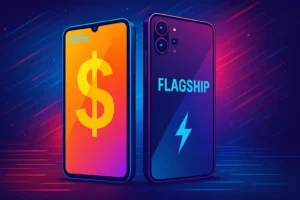Introduction
Artificial Intelligence (AI) has become a game-changer in smartphone technology, revolutionizing how users interact with their devices. From improving photography to enhancing battery life and providing real-time assistance, AI has seamlessly integrated into modern smartphones, making them smarter, faster, and more intuitive. This article delves into the various ways AI is transforming smartphones and the impact it has on user experience.
The Evolution of AI in Smartphones
AI in smartphones started with basic voice assistants but has rapidly evolved into sophisticated machine learning models that enhance various functions. Major tech companies like Apple, Google, and Samsung have heavily invested in AI-powered features, making modern smartphones more intelligent than ever before.
Key Milestones in AI Integration:
- Voice Assistants (Siri, Google Assistant, Bixby) – Early implementations of AI, helping users perform basic tasks via voice commands.
- AI-powered Cameras – Introduction of computational photography for better image processing.
- On-device AI Chips – Neural processing units (NPUs) improve performance while conserving battery.
- AI-driven Personalization – Enhanced UI/UX based on user behavior.
- Security Enhancements – Facial recognition, AI-based malware detection, and biometric authentication.
AI-Powered Features Enhancing User Experience
1. AI-Powered Photography & Videography
Smartphone cameras have seen a revolutionary transformation thanks to AI-driven computational photography. AI optimizes images in real-time by adjusting lighting, contrast, and even removing noise.
Key AI Camera Features:
- Scene Recognition: Identifies different objects (food, landscapes, portraits) and optimizes settings accordingly.
- Night Mode: Enhances low-light photography by capturing multiple frames and merging them.
- Portrait Mode & Bokeh Effects: AI distinguishes foreground and background for DSLR-like depth-of-field effects.
- AI Video Stabilization: Reduces shakes and enhances video smoothness using machine learning.
- Super Resolution Zoom: Uses AI to digitally enhance zoomed images for clarity.
2. AI in Voice Assistants & Real-time Transcription
AI-driven voice assistants have evolved into highly sophisticated tools that can perform a variety of tasks beyond setting alarms and answering questions.
How AI Enhances Voice Assistants:
- Natural Language Processing (NLP): AI allows assistants to understand context better.
- Real-time Translation & Transcription: Services like Google Translate leverage AI for near-instant language translation.
- Conversational AI: Assistants provide personalized responses based on past interactions.
3. AI in Battery Management & Performance Optimization
AI extends battery life and improves performance by intelligently managing resources.
AI Battery Optimization Techniques:
- Adaptive Battery: Learns user habits and prioritizes power for frequently used apps.
- AI-based Fast Charging Management: Ensures battery longevity by controlling charging speed.
- CPU & GPU Optimization: AI monitors app usage and adjusts processor performance accordingly.
4. AI-Powered Security & Privacy Enhancements
AI plays a critical role in strengthening smartphone security by enabling smarter biometric authentication and malware detection.
AI Security Features:
- Facial Recognition & Fingerprint Scanning: AI-based biometric security is more secure and faster than traditional methods.
- AI-Powered Fraud Detection: Identifies suspicious activity and alerts users about phishing threats.
- On-device AI for Data Privacy: AI processes data locally to minimize cloud dependency, ensuring better privacy.
5. AI in Personalized User Experience & Accessibility
AI enhances usability by adapting to individual user habits, making smartphones more intuitive and accessible.
AI Personalization Features:
- Adaptive Brightness & Sound Levels: Adjusts settings based on user behavior.
- Smart Recommendations: AI curates music, videos, and news tailored to user preferences.
- AI Accessibility Features: Text-to-speech, gesture controls, and AI-powered screen readers help users with disabilities.
6. AI in Gaming & Augmented Reality (AR)
AI is enhancing mobile gaming and AR experiences with real-time optimization and immersive interactions.
AI Gaming Features:
- AI-driven Game Enhancements: Adjusts graphics settings dynamically for optimal performance.
- Smart AI Opponents: NPC behavior improves with machine learning.
- AI-Powered AR Filters & Applications: Enhances face recognition for AR applications like Snapchat and TikTok.
The Future of AI in Smartphones
As AI technology continues to evolve, its role in smartphones will expand further. Some of the upcoming trends include:
- Advanced AI Chatbots – More human-like interactions with AI assistants.
- Better AI-Powered Personal Health Tracking – AI will provide more accurate health insights using smartphone sensors.
- AI-Powered Augmented Reality (AR) & Virtual Reality (VR) – AI-enhanced immersive experiences for gaming and business applications.
- AI-Driven Quantum Computing Integration – Could revolutionize data processing speeds in smartphones.
- Smarter AI for Call Filtering & Spam Detection – Enhanced AI to combat robocalls and spam messages.
Conclusion
AI in smartphones has significantly enhanced user experience by making devices smarter, faster, and more efficient. From photography to security, battery management, and personalized recommendations, AI is at the heart of modern smartphone innovations. As AI technology continues to evolve, the possibilities for further improvements in smartphone capabilities remain limitless, promising an even more intuitive and immersive user experience in the future.

